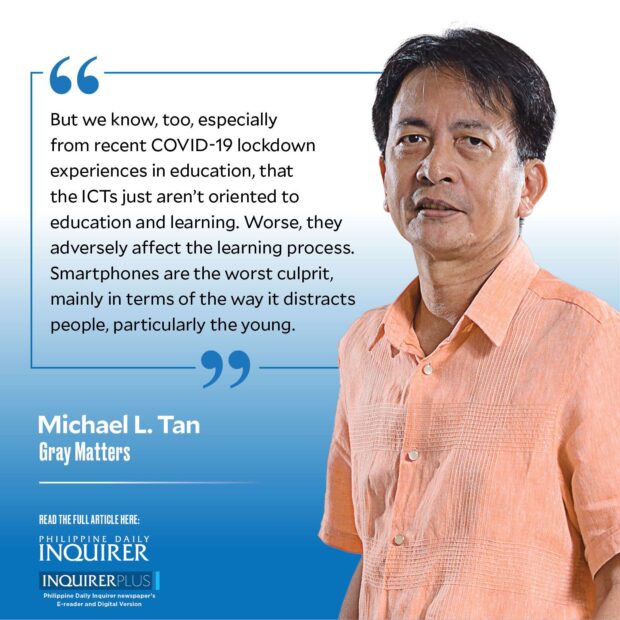Smartphones: Not so smart
When the new digital information and communications technologies (ICTs) first emerged in the 1960s, all kinds of projections were made on how they would revolutionize—for the better—all aspects of our lives.
Among the ICTs, the laptop computer and cellphones, especially smartphones, were projected to facilitate learning, even taking over from teachers.
Being both an educator and a parent, I saw how the optimism became more guarded through the years, with more and more warnings coming from researchers who saw the downside of these new technologies.
COVID-19 was a major turning point as educational institutions throughout the world were forced to shift to online learning. It was here where the new ICTs’ limitations, as well as risks and dangers, became more explicit.
Recently, the United Nations Educational, Scientific, and Cultural Organization (Unesco) issued its 2023 Global Education Monitor, with the theme “Technology in Education: A Tool on Whose Terms?” raising many serious questions about the ICTs in education.
Many international newspapers picked up on that report but chose to focus on Unesco’s rather critical analysis of smartphones, citing the UN organization’s statistics showing that one out of every four countries in the world now ban or restrict these gadgets in schools.
It was a pity that the bulk of the Unesco report did not receive the attention it deserved because Unesco’s point was that ICTs in general need to be examined more critically, with a call to “put learners first,” whatever the digital product might be.
I will therefore write two columns drawing on materials from the Unesco report, focusing today on the smartphones and, next week, looking at the broader contexts of the ICTs.
The Unesco report acknowledges that digital ICTs have brought many benefits but, paradoxically, the most problematic of these ICTs’ impact is that they seem to have done little to improve learning, in and out of schools.
Unfortunately, technologies are not always developed with education and learning in mind. In the case of smartphones, the studies suggest they have actually reduced educational or academic performance. The most dramatic example comes from looking at Programme for International Student Assessment (Pisa) results in reading, math, and science, with the Philippines generally ranking among the lowest in scores.
Pisa includes other data besides academic performance, an important one being the students’ use of ICTs, including smartphones, and researchers have noticed that ICT usage has been increasing over time. If indeed these ICTs improve academic performance then the Pisa test results would have reflected it. Instead, we find that in many countries, including the Philippines, students’ scores have deteriorated.
Certainly, the deterioration comes about not just because of ICTs but because of deficiencies in teachers and teaching, schools, and infrastructure.
But we know, too, especially from recent COVID-19 lockdown experiences in education, that the ICTs just aren’t oriented to education and learning. Worse, they adversely affect the learning process. Smartphones are the worst culprit, mainly in terms of the way it distracts people, particularly the young. Smartphones constantly draw young people’s attention away from academic work, not just of the person using the phone but also of other people around. Worse, one study found it took up to 20 minutes for students to refocus back on the academic work they were doing before being distracted. You can imagine what it was like during the lockdown’s online classes when teachers could not check on what students were doing from their homes.
Other studies found greater use of the ICTs and phones was correlated with less curiosity, less self-control, and reduced emotional stability. This takes us to the problem of cyberbullying, which has become so much more prevalent through smartphones. The smartphone has made it so much easier to spread misinformation, as well as to cyberbully, which can only be described as mob rule. At the University of the Philippines Diliman we had one case a few years back where the student was driven to suicide, literally by students on social media acting as judge … and executioner.
Next Monday, I will write more about smartphones and move on to other ICTs. I will also present some measures that can be taken, short of outright bans, in schools and in homes.
The Unesco report can be downloaded: search for 2023 Global Education Monitor.
mtan@inquirer.com.ph





















